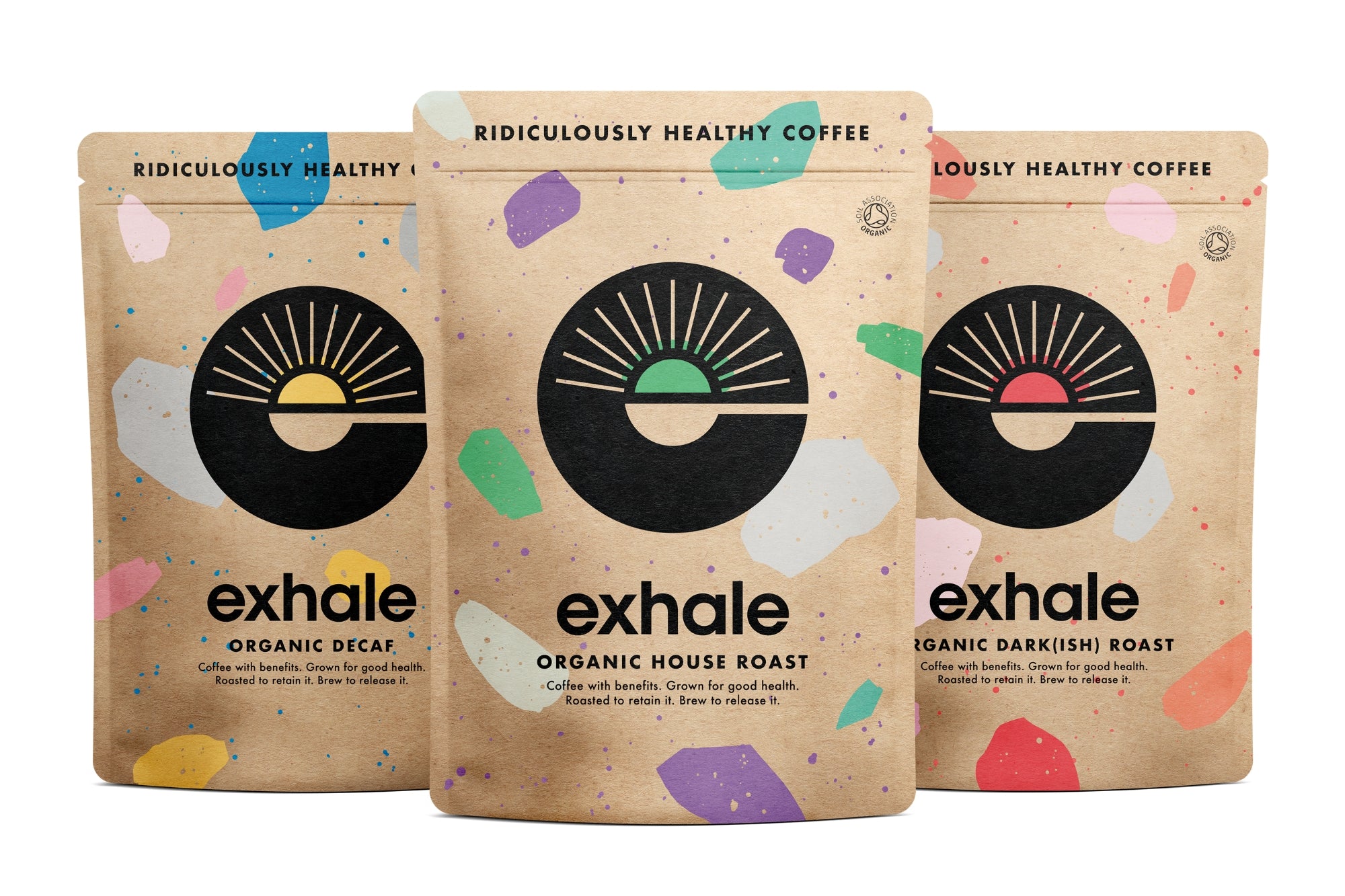Coffee and Brain Health
“Lifelong coffee/caffeine consumption has been associated with prevention of cognitive decline, and reduced risk of developing stroke, Parkinson's disease and Alzheimer's disease.”
That’s a pretty powerful quote! When exploring the relationship between coffee and brain health we can separate it in to short term benefits and long term benefits.
In the short term, caffeine intake improves performance on memory tasks, mood, concentration, vigilance and reaction time.
Interestingly coffee may also support memory consolidation when consumed after studying. So remember, go and brew that coffee once you’ve finished reading this blog!
However, it’s the longer term health benefits that we get most excited about…
Studies have established a reduced risk of memory decline during normal ageing in regular coffee drinkers. As already mentioned, we also see a reduced risk of Alzheimer’s Disease (AD) and Parkinson’s Disease, as well as mood-based disorders such as depression and anxiety. Research has also looked into the role of caffeine and its benefits in headaches and migraines when taken with classical analgesics such as ibuprofen.
Let’s look at each of these in more detail.
Headaches/Migraines
Altogether, the addition of at least 100 mg caffeine to commonly used analgesic(s) (e.g paracetamol, ibuprofen or aspirin) appears to increase the likelihood of achieving a good level of pain relief. That equates to the typical amount of caffeine in a filtered coffee.
Alzheimer’s Disease
The World Health Organisation refers to Alzheimer's disease (AD) as a ‘global health priority’. As the average age of the world's population is increasing, so too is the rate of AD.
One study found that coffee drinkers at midlife had lower risk of dementia and AD later in life compared with those drinking no or very little coffee. The lowest risk (65% decreased!) was found in people who drank 3-5 cups per day.
Parkinson’s Disease
Parkinson’s disease is the second most common neurodegenerative disease, affecting 1% of the world population age 65 and older. The number of individuals diagnosed with PD is expected to double by 2030 in line with the ageing population. It is related to degeneration of dopamine neurons in the mid-brain and as a result treatment includes dopamine replacement to control symptoms.
Several meta-analyses have shown that moderate coffee intake lowers one’s risk of developing PD by 24–30%. A maximal effect was found at about 3 cups of coffee per day.
Moreover, the adenosine A2A receptor (the main target of caffeine action) has emerged as a leading target for treatment of PD.
“methylxanthines may affect signaling pathways that enable neurons to overcome dysfunction and degeneration”
The strongest associations have been found for methylxanthine consumption and Parkinson’s disease (PD) incidence. Methylxanthine is one of the many components in coffee.
How Does Coffee Influence These Short And Long Term Effects??
Well, short term benefits (in chronic consumers) come partly from the fact that coffee increases the receptors of serotonin, GABA, and acetylcholine. This may contribute to the elevated mood and perceived increase in energy we feel after a coffee.
To break this down: serotonin is involved in mood and appetite regulation, GABA is an inhibitory neurotransmitter and thus causes relaxation and sleep, and acetylcholine is involved in muscle contraction.
In regard to long term benefits, it is thought that they partly come from coffees high polyphenol content, such as chlorogenic acid, an antioxidant that has anti-inflammatory benefit. As many now know, chlorogenic acid is something Exhale Coffee have specifically tested for to ensure our beans are of the highest quantity of this antioxidant compound.
But on the antioxidant point, research suggest that coffee consumption can increase glutathione levels and improve protection against DNA damage. Glutathione is the main antioxidant in the body with anti-inflammatory and immune benefiting properties. Essentially coffee seems to upregulate our own endogenous antioxidant systems.
Inflammation is considered one of the hallmarks of neurodegeneration and depression.
Another mechanism that might explain the reduced risk of these conditions in regular coffee consumers is related to blood sugar balance. Research suggests that consumption of coffee reduces the risk of developing type 2 diabetes.
“It has been shown that drinking four cups of coffee daily would decrease the risk of type 2 diabetes by more than 25%.”
Type 2 diabetes has also been heavily linked to neurodegenerative diseases such as dementia, Parkinson’s disease, and most notably Alzheimer’s disease. In fact Alzheimer’s disease has recently been referred to informally as “type 3 diabetes.”
Research also discuses the role that caffeine plays within this relationship.
Polyphenols found in coffee also have systemic benefit which translates into cognitive benefits. Chlorogenic acids have been shown to counter hypertension and obesity, both of which are risk factors for cognitive decline, leading to mild cognitive impairment and AD. A recent study has also shown that chlorogenic acids can shorten sleep latency, which is the amount of time taken to transition from wakefulness to sleep. This is significant in improving sleep quality, which is essential in maintaining cognitive function, as metabolic waste products in the brain are cleared during sleep (by something called the glymphatic system).
Considering these findings, it is possible that long-term daily intake of chlorogenic acid may prevent cognitive disorders not only via direct neuroprotective action, but also indirectly by improving metabolic syndrome and sleep quality.
Perhaps The Coolest Part: The Brain Is ‘Plastic’
It amazes me to reflect on the fact that it is not much more than 20 years ago when we realised the adult brain was able to generate new nerve cells, something called adult hippocampal neurogenesis (AHN). Some environmental factors have been shown to influence this such as exercise, enriched environments (think stuff like colour and music), and caloric restriction, whereas stressful conditions have a decreasing influence.
AHN is also said to play a role in different neurodegenerative, neurological, and psychiatric disorders such as Alzheimer's and Parkinson's disease, anxiety, and depression. And yep, you’ve guessed it, those polyphenols have been shown to increase AHN too!
Conclusion
Increasing evidence suggests that regular moderate consumption of coffee can enhance brain health and reduce our risk of neurodegeneration, depression, and anxiety.
And don’t forget, post study caffeine administration enhances memory consolidation, so now you’ve (hopefully) learnt something, it’s a great time to take a pause, and go and brew yourself a cup of Joe to consolidate this new, and hopefully fascinating, information! That’s a pretty cool hack right there!
References
Camandola et al., (2019) Impact of Coffee and Cacao Purine Metabolites on Neuroplasticity and Neurodegenerative Disease, Neurochem Res, 44(1):214-227
Onatibia-Astibia (2017) Health benefits of methylxanthines in neurodegenerative diseases, Mol Nutr Food Res, 61(6)
Hong et al., (2020) The Effect of Caffeine on the Risk and Progression of Parkinson's Disease: A Meta-Analysis, Nutrients, 22;12(6):1860
Qi & Li (2014) Dose-response meta-analysis on coffee, tea and caffeine consumption with risk of Parkinson's disease, Geriatr Gerontol Int,14(2):430-9
Eskelinen et al., (2009) Midlife coffee and tea drinking and the risk of late-life dementia: a population-based CAIDE study, J Alzheimers Dis,16(1):85-91
Borota et al., (2014) Post-study caffeine administration enhances memory consolidation in humans, Nat Neurosci,17(2):201-3
Sinyor et al., (2020) Alzheimer’s Disease, Inflammation, and the Role of Antioxidants, J Alzheimers Dis Rep; 4(1): 175–183
Hussain et al., (2018) Caffeine: A Potential Protective Agent Against Cognitive Decline in Alzheimer’s Disease, Critical Reviews™ in Eukaryotic Gene Expression, 28(1):67–72
Negida et al., (2017) Caffeine; the Forgotten Potential for Parkinson's Disease, CNS Neurol Disord Drug Targets;16(6):652-657
Nehlig (2016) Effects of coffee/caffeine on brain health and disease: What should I tell my patients? Pract Neurol; 16(2):89-95
Dias et al., (2012) The Role of Dietary Polyphenols on Adult Hippocampal Neurogenesis: Molecular Mechanisms and Behavioural Effects on Depression and Anxiety, Oxid Med Cell Longev: 541971.
Patil et al., Cuppa joe: friend or foe? Effects of chronic coffee consumption on cardiovascular and brain health, Mo Med . Nov-Dec 2011;108(6):431-8
Socala et al., Neuroprotective Effects of Coffee Bioactive Compounds: A Review, Int J Mol Sci, 2020 Dec 24;22(1):107
Colombo & Papetti, An outlook on the role of decaffeinated coffee in neurodegenerative diseases, Crit Rev Food Sci Nutr. 2020;60(5):760-779
Wasim et al., Neuroprotective and Neurodegenerative Aspects of Coffee and Its Active Ingredients in View of Scientific Literature, Cureus . 2020 Aug 5;12(8):e9578
Nabavi et al., Chlorogenic Acid and Mental Diseases: From Chemistry to Medicine, Curr Neuropharmacol . 2017;15(4):471-479





1 comment
Dany Emozione
I’m so excited to have your coffee delivered to my door, and learn more from your newsletters!
Stay safe and healthy
God bless you
Dany 😀 ☕️💚
Leave a comment
All comments are moderated before being published.
This site is protected by hCaptcha and the hCaptcha Privacy Policy and Terms of Service apply.